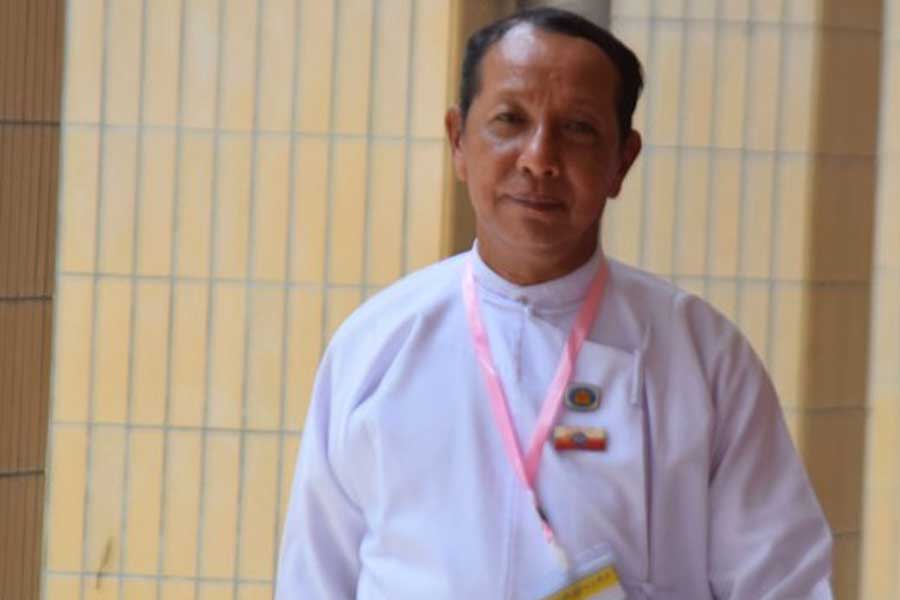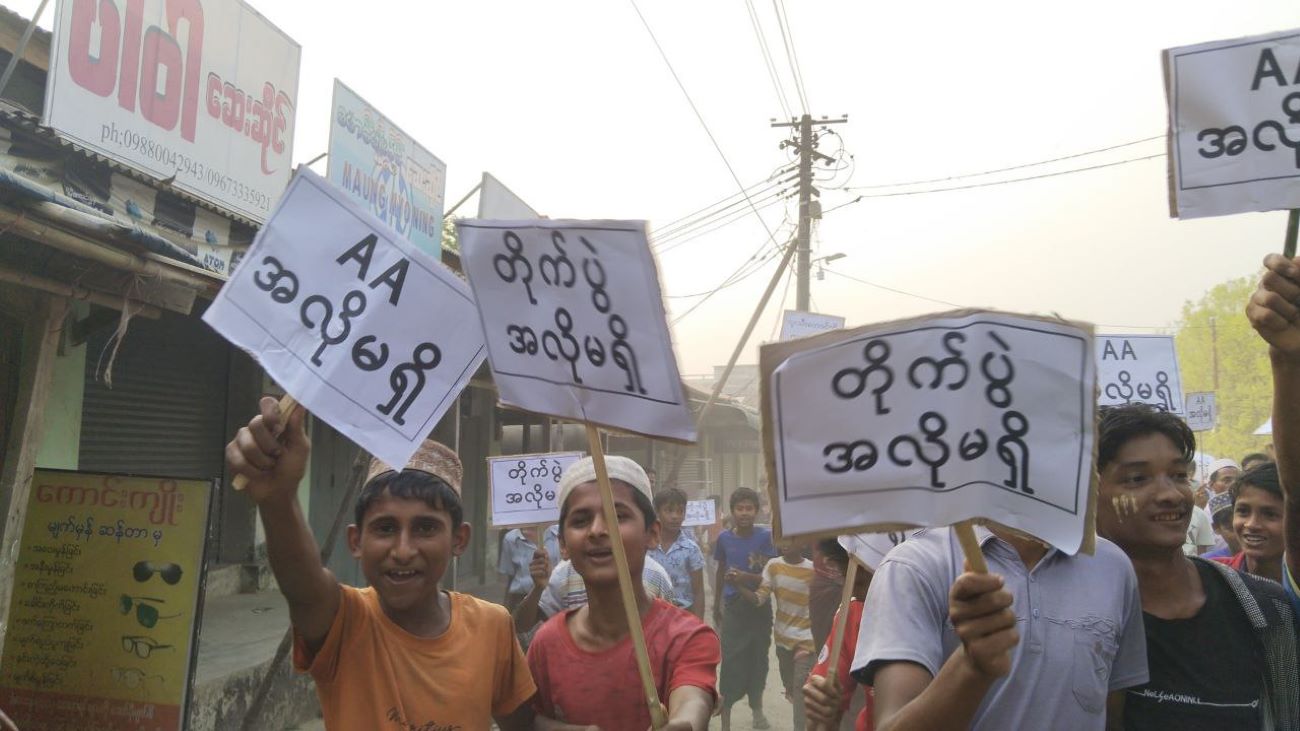- Arakan residents call for air raid warning systems amid surge in junta airstrikes
- Arakan’s Breathing Space (or) Mizoram–Arakan Trade and Business
- Death toll rises to 18 after junta airstrike on Ponnagyun village market
- Regime arrests dozens of Muslims in Sittwe over alleged Arakan Army links
- Over 200 IDPs in Ponnagyun struggle without shelter, food aid
Interview: Political, military analyst U Pe Than on current state of Arakan
Political and military analyst U Pe Than recently spoke to DMG about the objectives of the AA and its political wing, the United League of Arakan (ULA), as well as discussing the current state of the military regime, and Muslim issues in Arakan State.
17 May 2024

DMG Newsroom
17 May 2024, Sittwe
Fighting has been raging in Arakan State for more than six months, since the Arakkha Army (AA) launched an offensive on November 13. The AA has seized several Arakan State townships, as well as Paletwa Township in neighbouring Chin State, and is currently attacking Buthidaung, Maungdaw, Ann and Thandwe townships. The regime is mounting a strong defence in those townships.
Political and military analyst U Pe Than recently spoke to DMG about the objectives of the AA and its political wing, the United League of Arakan (ULA), as well as discussing the current state of the military regime, and Muslim issues in Arakan State.
DMG: To what extent has the AA achieved its goals in Arakan State?
U Pe Than: The AA has said it wants to gain at least confederate status for Arakan State. To realise that goal, it must have military strength and a large swath of territory. It must have the upper hand in the battle. Only then will it have a bargaining chip in holding talks with the other side. By military strength, I mean the AA must be militarily strong enough to retain the territory it has seized.
DMG: Does the regime’s national conscription law have an impact on Arakan State?
U Pe Than: I heard the regime was able to recruit a few in Manaung in southern Arakan State. There were no reports of conscription in other places. The regime can’t conscript in central and northern Arakan, which is controlled by the ULA/AA. In those townships, junta soldiers are confined to bunkers. They can’t recruit or provide military training.
DMG: What is your view on the regime’s use of Muslims in the battle for Arakan State?
U Pe Than: The regime has offered incentives to persuade Muslims in Buthidaung, Maungdaw and Sittwe. It has armed them to create tensions between Muslim and Arakanese communities. Muslims were sent to the front line. They apparently believed what the regime promised to them. They are serving willingly. The regime can use Muslims for two purposes — to fight, and to incite inter-communal hatred.

Muslim communities must be aware of that. Political and faith leaders must intervene if necessary. Muslims should not defend that they were forced to enlist. It is not a good reason. Arakanese people are also there. No one enlisted. The ULA-controlled territory is just outside the town. ULA has also invited them to join it.
In my view, the friend of an enemy is an enemy. They should not cooperate with an organisation that has committed genocide against their people. They should not attack Arakanese civilians who live together with them in Arakan State. Muslims should be aware of that.
The regime has carried out numerous war crimes and is facing a trial at the International Court of Justice for genocide against Muslims. Their hands still smell of blood. Muslims should not cooperate with them. Protests against the ULA/AA, on which the Arakanese people pin their hopes, can make Arakanese people unhappy. The AA has urged Arakanese people not to fall into the junta’s trap. But if the regime resorts to desperate measures, it can ultimately create problems between Arakanese and Muslims in the long run.
The ULA/AA has urged Arakanese people to exercise restraint. So, we engage with Muslims constructively. The AA has eased restrictions on Muslims such as travel restrictions and the ban on marriage. Today, Muslims can go to schools, hospitals and travel freely thanks to the AA. If the regime is doing the opposite, it will leave a stain on history.
DMG: What is your view on Muslim protests against the AA in Sittwe and Buthidaung?
U Pe Than: Of course, they are orchestrated by the regime. The regime might have offered incentives for them. But Muslims need to consider whether they should do it or not. Their excuse, that they were coerced, is not acceptable. No Arakanese has staged a protest against the AA. Muslims must be aware of that.
DMG: Are internally displaced people in Arakan State receiving the humanitarian assistance they need?
U Pe Than: They receive little assistance from the international community. The regime restricted the humanitarian operations of international organisations after Cyclone Mocha. Since then, international organisations have been able to provide little help.

Arakan State is facing serious food shortages, and commodity prices are steep. Local donors can’t help like they did before. Because there are many displaced people everywhere, they receive little help. Some are taking shelter with their friends and relatives. And some are taking shelter in monasteries and schools. They may receive help from the township ULA and donors. Local villagers will share food with them. This is how they are surviving. They are enduring with the hope that the fighting will end soon, and they will be able to return home then.
DMG: What do you have to say about the military regime’s aerial attacks on civilian populations during the war?
U Pe Than: Among the military regime’s army, navy and air forces, the Air Force’s airstrikes are unlimited. The revolutionary forces are also weak [in defending against air attacks], with almost no weapons to defend against the regime’s airstrikes. As the regime can’t rely on the army, it continues to attack people with aeroplanes and heavy weapons.
The regime launched airstrikes on innocent people, villages, monasteries and schools. Since the regime only harms the people, the people are more resentful and don’t support them anymore. That’s why the regime’s airstrikes are not effective, but the people suffer.
AA troops have taken cover in the jungle, among other places, so they had no difficulty fending off the regime’s airstrikes. The main victims of the regime’s airstrikes are the people. People don’t know where they [the regime] will come from and where they will attack. People must risk their lives just by living.
Aerial fire does not contribute to the success of the battle. Everyone could see that their camps were falling one by one, no matter how many airstrikes they did. I want to say that the regime’s airstrikes are only meant to harm the people as a deterrent, and will not work.
DMG: How much impact do you think the UN Human Rights Council’s resolution not to sell jet fuel to the regime will have?
U Pe Than: Although the United Nations states that the countries of the world should not sell jet fuel to the Myanmar military regime, in fact, there are core countries such as China and Russia that support the military regime militarily and politically. From those countries, even if not openly, they covertly protect the Myanmar military regime and sell it jet fuel. The military regime can get jet fuel from these countries that protect it.
There will be loopholes because the UN resolution cannot be implemented precisely at times, I think, if the United Nations is not in a position to take specific action and identify the countries that secretly sell jet fuel to the Myanmar military regime. But in the long run, it may be a little limiting. Myanmar’s military regime may have limited access to jet fuel. This will not happen until the military regime runs out of [its existing] fuel [stocks].
DMG: Will China’s intervention be successful in attempting to stop the latest fighting in Arakan State?
U Pe Than: Hostilities have often stopped due to China’s pressure. The military regime asked the Japanese special envoy to Myanmar Sasakawa and China for help and made a ceasefire in Arakan State [previously]. At this time, the ULA/AA is fighting city by city in Arakan State, and the current fighting is different from the previous fighting.
In the north of Shan State, the Three Brotherhood Alliance attacked the military, but when China pressured them, they stopped the war. But the latest fighting in Arakan State does not stop. Now, it is known that China is pressuring to stop the fighting in Arakan State and there are discussions. But the ULA/AA hasn’t stopped fighting or attacking the junta troops fiercely. This means that AA seems to be fighting to achieve a military objective.
The AA, in particular, is attacking the Myanmar military so that the entire northern and central parts of Arakan State become a completely free region. Only then would the AA be able to control the border areas and step up its military offensive to establish an independent region. Therefore, China’s pressure cannot be resolved today, and the AA will continue to attack the Myanmar military as long as its military objectives are not achieved.
DMG: Finally, please provide an overview of the latest hostilities in Arakan State.
U Pe Than: The AA has so far seized nine towns in Arakan and Chin State since renewed fighting began in November last year. The regime cannot recapture the townships captured by the AA. Also, while the ULA/AA is full of military confidence, the junta soldiers are afraid and know that ‘if we fight, we will lose to the AA’, so they don’t want to give too much life at this time. This is the reason why hundreds of junta soldiers have fled to Bangladesh or defected to the AA.
All in all, the rest of the towns in Arakan State will also fall into the AA’s hands one by one.







.jpg)












